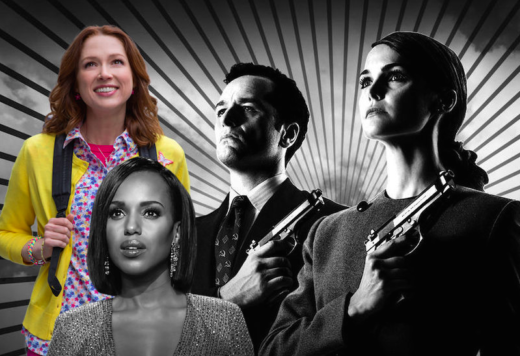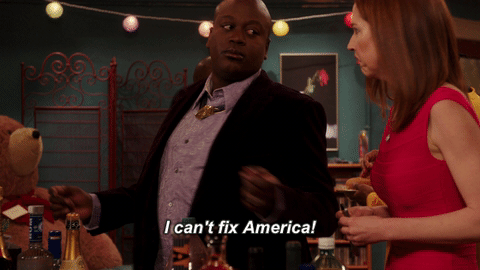Back in February, David Frum, former speechwriter for President George W. Bush, jokingly likened the first few weeks of the Trump administration to my favorite show about Russian spies:
In the Age of Trump, Escapist Entertainment Has Become an Impossibility

I laughed, re-tweeted, and then stopped laughing. Wait, I do sort of feel like an off-screen extra in an episode of The Americans!
It has become uncanny to watch fictional stories in this age of post-truth, alternative facts, and daily melodrama. Nothing feels entirely fictional or entirely real; what used to be a respite of guilty pleasures and genuine entertainment is now an eerie reminder of the specific uncertainties, dangers, and horrors of this particular time.
My suspension of belief no longer exists, and even if it did, it doesn't seem smart or responsible to suspend it. Of course, fiction usually seeks to reveal something about our lives and our worlds, but this current intersection between fiction and reality is something different for me.
In Hulu's comment sections under episodes of The Handmaid's Tale, people debate our current dystopia more than anything related to plot or character. In January, Orwell's 1984 had a 9,500 percent increase in sales, as readers no doubt wanted to brush up on doublethink. Even The Bachelorette, which is usually quite willfully anachronistic, has the first black Bachelorette being courted by a man who allegedly believes Black Lives Matter is a terrorist group and liberal woman aren't to be trusted.
While I haven't re-read 1984, I have found myself drawn to watching Scandal again, a particularly soapy show that I'd given up on years ago when it went off the rails. I was curious to see how the narrative would unfold, considering our reality seems more nail-biting and suspenseful than anything we could make up. I was not surprised that the gory, amoral roller coaster suddenly had the sickening gravitas of one of those true crime TV documentaries. None of the behind-the-scenes machinations felt that far-fetched. In fact, the murder, mayhem, and subterfuge is all quite symbolically rich, as if there is something meaningful to be gleaned from Elizabeth getting bashed with a baseball bat or the Electoral College being blackmailed. Scandal has become an artsy exposé!
After speaking with writers from Scandal, House of Cards, Veep, and Madam Secretary, The New York Times' Jim Rutenberg discovered the new reality of what it's like to write TV in the age of Trump: "Suddenly, the writers who work on political television shows were competing less with one another and more with real life, because of a president who transformed their seemingly escapist scripts into something resembling nonfiction — and scrambled the traditional notions of political cause and effect that they tended to base their drama upon."
That's at the heart of it for me, as a fiction writer and someone who loves stories: what role does fiction play when the truth is stranger than fiction, and when it's ever more essential that we value and uncover the truth?
Perhaps fiction, even the lighthearted television variety, has a responsibility to keep us alert to our reality rather than inspire us to escape it. Not everyone and everything has to be political all the time, and yet I have to admit that, lately, when I watch a show that doesn't at least somehow engage with our current political and cultural climate, I find myself asking, What is the point of this? Even comedy sitcoms like Black-ish and Kimmy Schmidt find a way to get some commentary in.
The Handmaid's Tale has been discussed extensively (and very beautifully in Emily Temple's piece for Lit Hub). I've had a lot of mixed emotions and assessments while watching, but the most unfamiliar sensation has been a too-real sense of doom, fear, and portent. Most things I watch, even disturbing things, don't stick with me for too long afterwards. I take them in, think about them, and let them go pretty easily. But The Handmaid's Tale leaves this strange and unprecedented after-image that frightens me and inspires me to (among other things) stay updated on Amy's Siskind's list of things that are subtly changing around us. It's no surprise that women have been showing up to protests in red cloaks and white bonnets. It's really quite something to see images from the Texas State Capitol (and just the other day in Ohio) that evoke scenes from a book I read in 12th grade English class.
"Yes: your life, right now, is both text and context for this television show," Temple writes. Later, she continues, "...what it really does is remind us of the true precariousness of our own situation in America. We rely so much on the perceived rules of our society, but in fact we have almost no control. We assume that the rules will protect us, but those rules aren’t actually real."
What this all points to on a very macro and existential level is that what is "real" is so often not. We construct notions of something being lasting, fixed, and solid, and we use this illusion to comfort ourselves into a false sense of security and inaction. Sometimes, it is the illusion of fiction's unlikeliness, sometimes the illusion of a boundary or an impossibility. More and more, I get the impression our fictional stories are trying to point out the danger of the illusions, rather than weave them for our entertainment.
I'm reminded of the second part of Mark Twain's famous quote. "Truth is stranger than fiction, but it is because Fiction is obliged to stick to possibilities; Truth isn't." We have no idea what plot twist is coming next; the truth does not have to stick to what is possible.
Of course, this is just TV and pop culture that I'm considering here. Films, music, comedy, literature, and visual art are ever more vital (Google "any art form" in the age of Trump, and you get incredible results). As Charles McNulty writes in the LA Times, "The arts and the humanities nixed by Trump’s budget proposal pose a direct challenge to demagoguery. Literature, theater, music and the visual arts promote contemplation. They invite individuals to ask questions, consider alternative views and second-guess what they’ve been brainwashed into believing."
Let's keep paying very close attention to all the stories we're being told, and to what we believe is true.


